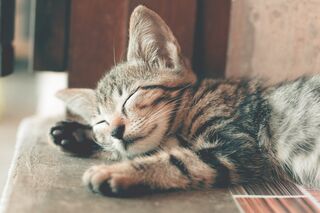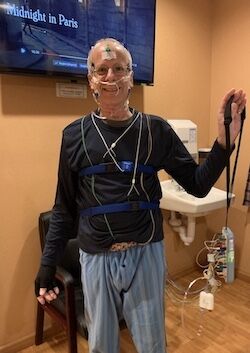Sleep
My Bout of Insomnia Blues
Personal Perspective: Mistaking being conscious for consciousness.
Posted April 14, 2022 Reviewed by Tyler Woods
Key points
- The subject—me—remains awake as much as three nights in a row.
- The subject tries everything imaginable to fall asleep, including an electric sheet and pillow case.
- The subject takes an overnight sleep study, an at-home sleep profiler test, and sees a neurologist.
- The diagnosis is...insomnia.
By Day 4 I was delirious, despairing, and spiraling downward into very dark states of mind.
In recent months, I have missed many 24-hour sleep cycles, as well as one 48-hour period, but this last one of 72 hours was a new personal record.

Some people have said, “You’re actually sleeping more than you think, you just feel like you’re up all night.” No. I’m not talking about a restless night in bed, tossing and turning. My hours of wakefulness do not take place in the bedroom. I simply never go to bed, because I find myself wide awake, my brain on high alert, as if on an all-night stakeout, only the person I am watching is me. Sleepiness simply never happens.
If you, like many before you, are already chomping at the bit to give me your favorite sleep remedy, please don’t. There is a 99 percent chance I have already tried it unsuccessfully.
Here is a partial list of things that I’ve tried, many of them on the same night:
- Ambien: It worked nightly for 12 years, some decades back, with no side effects. My psychiatrist had told me, “The thinking in the field now is that a full night’s sleep is more important than worrying about dependency, so we are going to intentionally get you addicted to Ambien, and not worry about it.” Twelve years in, however, it simply stopped working one night, and it has been ineffective ever since. My doctor said, “Oh. Well, I guess we burned out that neurotransmitter.” As an experiment, I tried it again recently, after some 15 years, and found I needed three Ambiens to get about four hours of sleep. Not a sustainable choice.
- Lunesta and Rozerem never worked from the git-go. I lasted one night on seroquel because I wound up smashing the cat plate with my foot in the middle of the night, en route to, as it turned out, the bathroom floor. I also lasted only one night on trazadone. Like melatonin, it gave me the heebie-jeebies, wanting to jump out of my skin.
- Xanax eventually burned out yet another neurotransmitter—anyone know how many neurotransmitters they give us to start out with?—after a substantial number of years when it definitely helped.
- Benadryl gives me a severe hangover and antihistamines are not recommended for regular use.
- About a week ago, in desperation, I took two 10-mg Valiums, two 20-mg Propranalols (a beta-blocker that calms the pounding heart) and two Flexorils (a muscle relaxant.) To give you an idea of their power: If my wife were to take 1/4th of one Flexoril, it would likely knock her out for 12 hours. All three together, at double doses, didn’t touch me. Not even a yawn. That’s when it dawned on me that I had reached a serious impasse.
- Two Reishi mushroom capsules;
- 500 mgs of Magnesium;
- 1,000 mgs of GABA;
- 200 mgs of L-Theanine;
- 200 mgs of 5-HTP;
- Two homeopathic sleep tablets;
- A "proprietary blend" of Ashwagandha and tart cherry juice extract.
- 100 mgs of a CBD gummy, the latest of over a dozen different CBD tinctures and products I’ve tried, with and without THC, along with straight-up cannabis of the sedating Indica variety.
- Obviously, "sleepy-time" tea with chamomile. (If anyone dares mention Valerian to me I will laugh in their face. You may as well offer me warm milk and honey.)
- I tried warm milk and honey.
- I took baths with lavender bath salts and bubbles before bed.
- I tried a sleep mask, with built-in Bluetooth speakers so that a variety of smooth-talking YouTubers could try lulling me to sleep. Guided hypnosis made me incredibly tense and agitated, especially when the voice said I was getting "more and more relaxed, and feeling sleepy."
- I tried listening to "binaural beats," a brain-regulating frequency.
- I had 12 acupuncture sessions in a period of about three weeks.
- I slept under a weighted blanket, and listened to not white, but “brown noise” on my phone, presumably a deeper frequency and more sleep-inducing than white noise. Between white and brown is pink noise, which I tried next. Pink noise, as far as I can tell, is essentially the sound of heavy rainfall. I like pink the best. I also like the deep and sonorous Tibetan monks chanting Om with bells. Neither one puts me to sleep, but I like them.
- I ordered a “grounding” sheet and pillowcase from a company that has essentially created an entire movement around the notion that one should go barefoot on the earth as much as possible—“earthing”—and insists that our predilection for running shoes has severed our connection to Mother Earth and all her healing properties. It being too cold to go barefoot at the moment, their workaround is the linen products, which get plugged into a grounded outlet and somehow reconnect you to the Earth while remaining in your bed on the third floor.
The prevailing view from most people was that I likely have sleep apnea: “Get thee to a sleep study,” I heard again and again, and all of my protestations fell on deaf ears, namely, that apnea wouldn’t be keeping me wide awake for three days running, not to mention that apnea would never even get a chance to show its face if I’m never actually unconscious. But I surrendered and went for an overnight sleep study, and well, a picture is worth etc., so take this image in, it will save me a lot of explaining:

What you can’t quite see in the photo is that I have six electrodes wired to my scalp, another five to my face, four under my shirt on my chest, and two wires going down each pajama pant leg and attached to my calves. I was on camera all night, connected to the tech person via live intercom. Let’s call her Linda. The idea that I was expected to fall asleep with all of those wires on me would have been absurd, ordinarily; however, like I said, I had been up for three days.
I called Linda to tell her I was freezing and she brought me another blanket and a space heater. I called Linda to tell her to turn the space heater off, as I was suffocating from the heat. I called Linda when I needed the bathroom, mercifully only once.
Because I was so sleep-deprived, I actually did sleep enough for them to gather the data, although when I actually fell asleep for real, around 4:15 a.m., Linda woke me at 5:30 a.m. to cheerfully inform me, "The study is over, time to get up and go home!" That made me extremely grumpy.
Four days later, I heard from them that I do not have apnea, and I was ready to move on to Part 2 of the study: an at-home, two-night “sleep profiler” test with some gizmo that looks like a FitBit, only it went around my head, connected via three electrodes to my forehead. Following that, I would finally consult with their resident neurologist/sleep specialist.
In the meantime, I, who have never been a regular drinker and have been virtually abstinent for most of the last decade, have taken up drinking red wine at night, because I suddenly remembered that the reason I started avoiding wine was because it had always made me either sleepy or depressed, or both. For the last few nights, as of this writing, the wine, in combination with a THC/CBD/CBN gummy actually did the trick—though I still top out at four-five hours. At age 69, is substance use really the best remedy for me?
The sleep study revealed I had a “Sleep Efficiency” of 55.8 percent, meaning I was awake 44.2 percent of the night; it took 97 minutes before "sleep onset"; I mildly snored 14 times, for a total of 192.9 seconds; I was in the bed 7.8 hours, sleeping a total of 4.4 interrupted hours, and I had 261 “Periodic Leg Movements.” This number was characterized as “severe,” and caused 38 arousals.
Thankfully, the neurologist had a cancellation and was finally able to see me the other day. He had reviewed the multiple-page printouts of both the overnight and the at-home tests, carefully weighed all the data and studied all the charts, and his professional opinion was: I have insomnia.
He referred me to an LCSW who does Cognitive-Behavorial Therapy for Insomnia, a short-term protocol that has been shown to be the most effective approach out there at the moment. I am doubtful, but we’ll see. It starts next week, and in the meantime, life is short and I’m certainly not going to lose any sleep over all this.


